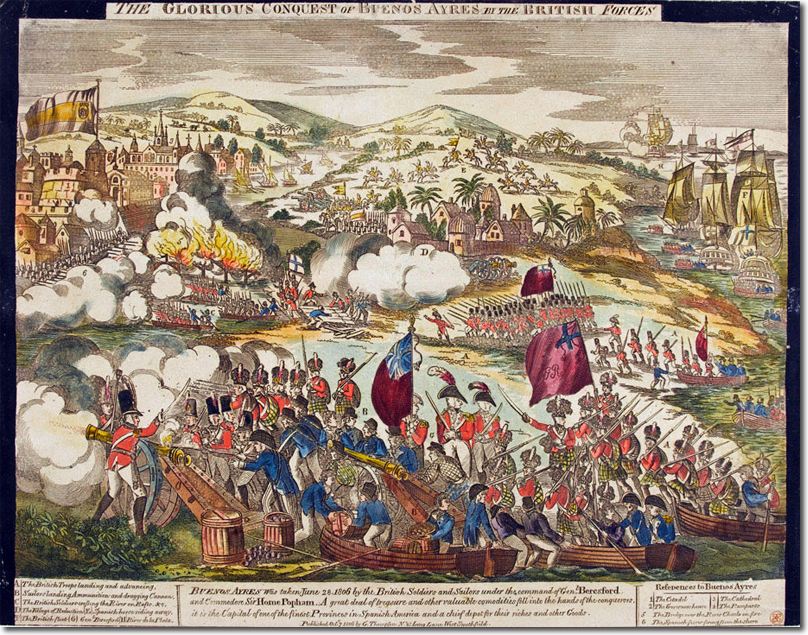After all the excitement of Waterloo, this week marks the anniversary of another British victory – albeit one that was rapidly followed by an ignominious defeat.
On 27 June 1806, Buenos Aires surrendered to British forces under Sir William Beresford. The British saw Buenos Aires almost as a target of opportunity. They had sent over 6,000 men to the Cape of Good Hope under Commodore Popham, but when the Cape fell unexpectedly easily Popham thought it would be a good idea to attack Buenos Aires. Buenos Aires was Spanish and we were at war with Spain, so it was a perfectly acceptable idea. A rapid conquest seemed possible because he believed, correctly, that the locals were unhappy with their colonial status and unlikely to resist the British effectively. Popham, whose views on cost-effective warfare had a lot in common with those of Donald Rumsfeld, was enthused by the prospect of plunder from the silver-rich province. Popham may have had official authorisation for his plan from the British government, but this was officially denied. There was no trans-Atlantic cable to send a request for permission in those days and senior officers were expected to act on their own initiative. Popham may well have done so.
Popham arrived in the River Plate in June 1806. According to some accounts, he was assisted in navigating the Plate by a British agent. (In my book, Burke in the Land of Silver, the agent was James Burke who we know was active in the area at the time.) The Plate is certainly not an easy river to navigate. Popham was quoted at the time as saying, “It was a bit bumpy,” as his ships nearly grounded on sandbanks.
Popham’s army was commanded by Colonel William Beresford. The illegitimate son of the 2nd Earl of Tyrone, Beresford had served under Wellington and was held by many (though not Wellington himself) to have a less than perfect grasp of military strategy. He landed his troops at Quilmes, fifteen miles from Buenos Aires. The Spanish did not have enough troops to mount an adequate defence and, as Popham had predicted, Beresford had an easy march, brushing aside the meagre forces sent to oppose him. On the 27 June 1806, Buenos Aires surrendered.
The Spanish governor had fled with the treasury, but Popham sent soldiers in pursuit and succeeded in capturing the money – over a million Spanish dollars. The treasure was duly sent to London where it was paraded through the streets in eight large wagons, each carrying five tons of silver pesos. £296,187 3s 2d was distributed as prize-money and Popham and Beresford were both made Freemen of the City of London.
Resolved unanimously, That the Thanks of this Court be given to Major-General Beresford and, Commodore Sir Hope Popham, and the Officers and Men under their respective Commands, for their very gallant Conduct, and the very important Services rendered by them in the capture of Buenos Ayres, at once opening a new Source of Commerce to the Manufactories of Great Britain, and depriving her Enemies one of the richest and extensive Colonies in her Possession.
Resolved unanimously, That the Freedom of this City, and a sword of the value of Two Hundred Guineas, be presented to Major-General Beresford, as the Testimony of the high Esteem which this Court entertains of his very meritorious Services.
Resolved unanimously, That the Freedom of this City, and a sword of the value of Two Hundred Guineas, be presented to Commodore Sir Home Popham, as the Testimony of the high Esteem which this Court entertains of his very meritorious Conduct.
– Chamber of the Guildhall of the city of London Thursday, 2 October 1806
There was some embarrassment when news reached London that by the time Popham and Beresford were being honoured, the Spaniards had already recaptured Buenos Aires. Popham was eventually court-martialed, but was let off with only a censure. It doesn’t seem to have done any damage to his career. He was made a rear admiral in 1814 and awarded a KCB in 1815.
Burke in the Land of Silver
The first of my books about James Burke was inspired by the events surrounding this invasion. James Burke was a real person and much of the story, with its double-dealing, wild women and political intrigue is closely based on fact. A thrilling tale from a time when the world was in turmoil and a few good men (or, I’m afraid, quite often bad men) could change the course of history. Burke in the Land of Silver is available in paperback or as an e-book. You can buy it on Amazon or, in the USA, also through Simon and Schuster. Here’s the link: mybook.to/LandofSilver
Picture credit
‘The Glorious Conquest of Buenos Ayres by the British Forces, 27th June 1806’ Coloured woodcut, published by G Thompson, 1806. Copyright National Army Museum and reproduced with permission.


Popham!!!! Just in the middle of writing about him myself. Great post and I enjoyed the book.
Thank you.
Is Popham a new British mega naval star? With him featured in books out or on the way, by Tom Williams, Lynne Bryant, and Jacqueline Reiter, one does start to wonder.
He’s quite a character. There’s definitely a novel (or two) in there. So far I think the three of us all have him in a supporting role, which is a bit sad.